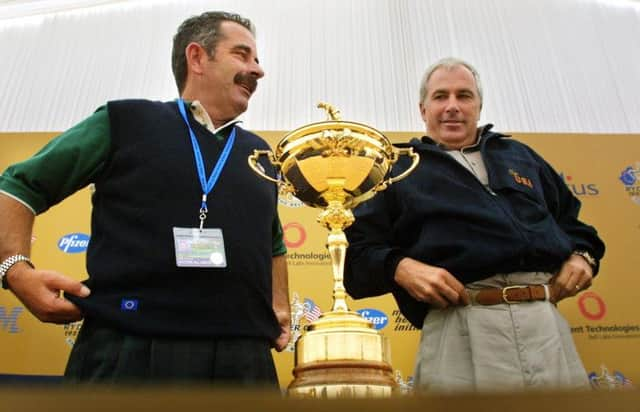How Torrance and Strange restored Ryder Cup sanity


Eight years after the infamous “War on the Shore” at Kiawah Island, the event was in danger of becoming a biennial brawl in the wake of the Americans raucously invading the 17th green when Justin Leonard holed a monster putt in the singles against Jose Maria Olazabal.
In the same match, Colin Montgomerie bore the brunt of some shocking verbal abuse from home fans, the extent of which led his opponent, Payne Stewart, to concede the match to the Scot with the contest having already being decided.
Advertisement
Hide AdAdvertisement
Hide AdMore than ever perhaps in the event’s history, bad blood was starting to simmer but, thanks in large part to Torrance and Strange through their efforts as opposing captains at the Belfry in 2002, the rivalry between the two teams at Gleneagles will be friendly for the event’s 40th staging.
“It was a five-second phone call,” said the Scot of what it took between him and Strange to make sure Brookline was not about to become the yardstick. “I’m not condoning what happened in 1999, but we are only human and the pressure of the Ryder Cup does put you to places you are not used to being. The emotions and the form of golf do that.”
Strange, who was speaking on behalf of Standard Life Investments, worldwide partner of the Ryder Cup, added: “We were fortunate to start with that Sam and I go back. We’ve been dear friends since the early 70s and that helped. When I was made captain, I called Sam a few days later and said ‘let’s do this’.
“The conversation lasted only five minutes and it was about civility, sportsmanship and etiquette. It had gone awry completely and we were going to be faced, especially me, by questions about the Country Club. I felt it was my responsibility to face that head on and I did.
“I think we did a good job. But, you know what, the players did the best job. It came up in conversation but I never sat them down in a team meeting and said ‘this is what happened at the Country Club and it can’t happen again’. They all understood. I enjoyed that challenge. But, then again, there’s never really been an issue over here.
“I must say that in my six days at the Belfry the fans could not have been any more cordial or hospitable or nice. Yes, they were rooting like hell for their own team, but they were good.
“What we like so much about the Ryder Cup is the emotion of the players because normally you don’t really see that. It spills over to the fans, the viewers on TV and the press, too. Everyone gets caught up in it. I’m not making excuses but, when that happens, you occasionally cross the line. Then you have to go back over it and say ‘don’t do that again’. You apologise and move on.”
While the sides were tied going into the singles, Strange ended up as a losing captain after a disappointing last day for the Americans, as, of course, was the case with Davis Love III when his charges surrendered the biggest lead at Medinah two years ago since Europe buckled in the aforementioned Brookline contest.
Advertisement
Hide AdAdvertisement
Hide Ad“Whoever would be critical of Davis, what did he do wrong?” said Strange. “I’ve heard people say he shouldn’t have let Phil [Mickelson] sit out on the Saturday afternoon. But they were four points up going into the singles.
“I felt good at the Belfry being even because, historically, we’d been stronger down the line in the singles. I told Phil one afternoon when I was captain that if we have a big lead after the first day I’ll rest you in one session on the Saturday. I don’t do statistics but it’s been proven that if a player does miss one of the four matches on the first two days his record is better in the singles.”
On the back of the USA only being able to muster two wins in the last nine matches, Tom Watson has been called into action again. He was the last man to lead the Americans to victory on European soil – at the Belfry in 1993 – and Strange reckons his re-appointment is a shrewd move by the PGA of America.
“I think you’d have more fear of Tom as a player because he’d have more control in terms of trying to win a particular match, but I think he is going to be a wonderful captain,” he said. “What does he bring? For starters, a large amount of respect for a couple of reasons. Firstly, his record in the game. He’s been there and done that. Also his age difference. It’s like your grandfather. You have a huge amount of respect for your granddaddy because he’s lived such a grand old life and experienced so many things. You listen to him – I certainly did.
“Tom Watson will almost be like that and he will get the attention of everybody. But does that win the Ryder Cup back for the US? Probably not. But it is that close. It comes down to a particular match and a particular player that desperately wants to impress his captain. That might be all it takes.”
Twelve years after coming out on top at the Belfry, Torrance will be back on Ryder Cup duty as one of Paul McGinley’s vice-captains. “Am I jealous of him?” asked Strange. “Yes, probably. You go into this a first-time father and second time around you’d know so much more. As in Tom Watson’s case.”